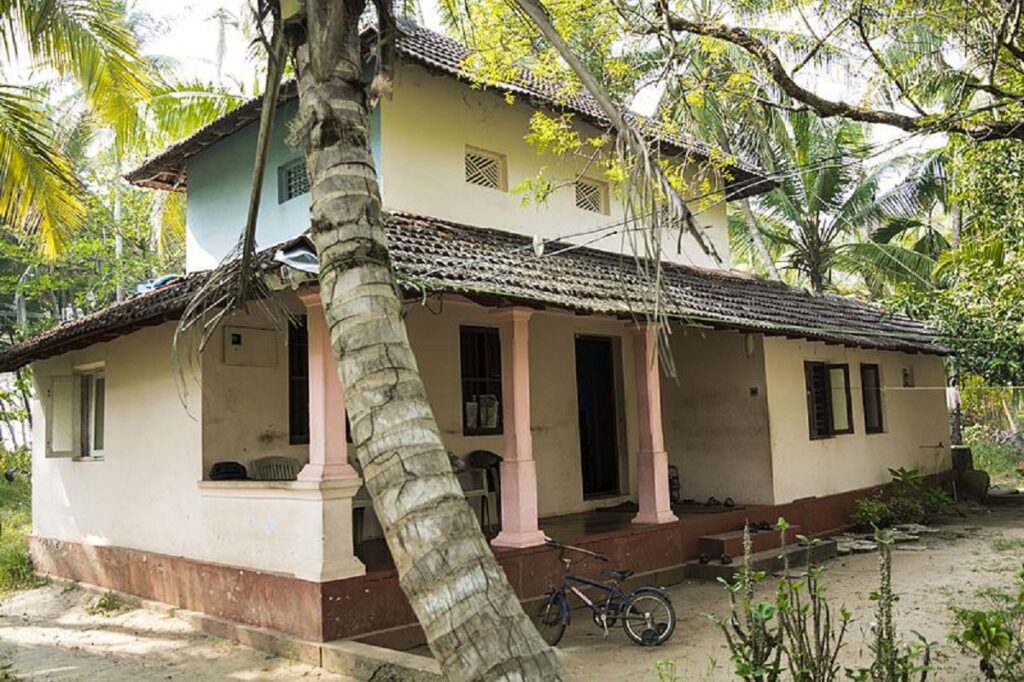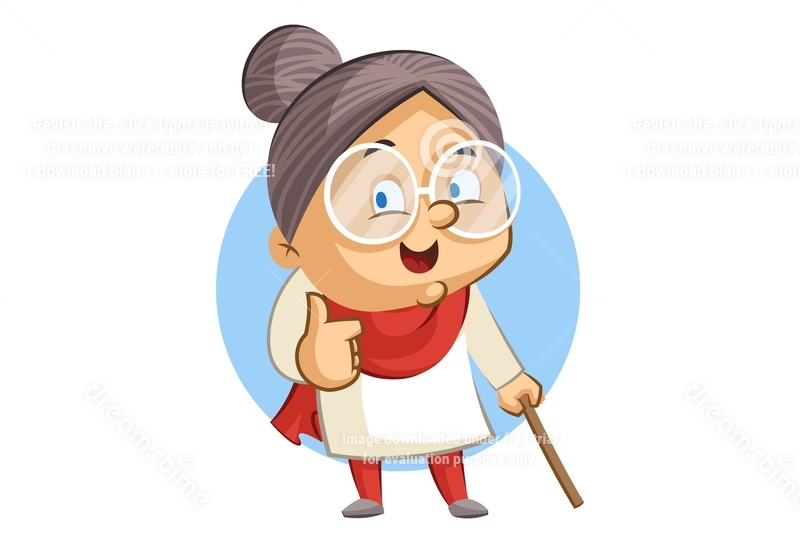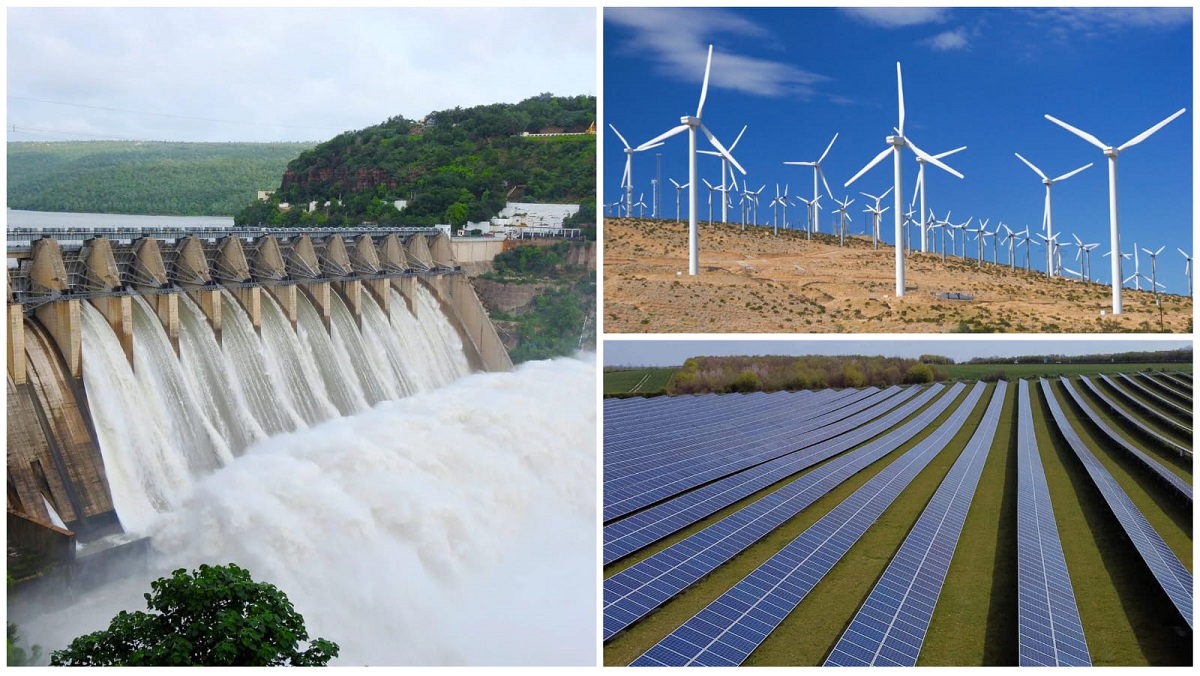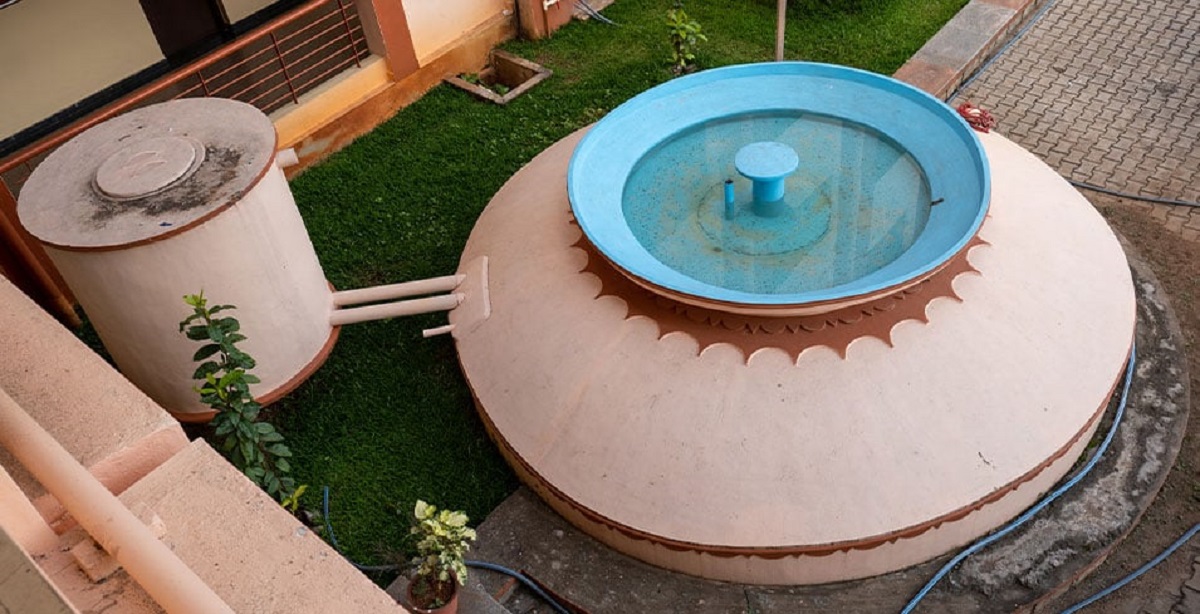Amma and her Universe – A climate-friendly lifestyle story
Climate-friendly lifestyle of 1983
The rooster crows at the break of dawn, waking up Amma to a new morning. She goes to the kitchen, lights the hearth with a few drops of kerosene, coconut shells and a match stick and goes out to fetch water from the well. When the rope brushes against the pulley while drawing water, the creaking sound is the alarm bell for the rest of the family lazily lying on the bed, listening to the birdsongs and the devotional songs through a loudspeaker from the nearby temple.
Amma filled a 3 kg aluminium pot with water, delicately carried it on her hips to the kitchen and placed the vessel on the first cooking pit while preparing tea on the adjacent one. She adds salt and sprinkles water to the roasted rice flour to get a crumbling texture for preparing puttu for breakfast. The fresh brown raw rice is harvested from the family paddy field and husked. It was pound yesterday, using the traditional large wooden mortar and pestle and roasted to dry the water content. Now the rice flour is dry enough to be stored at room temperature for two to three months.
Meanwhile, appa woke up listening to the noise of the kitchen chores. Right away, he went to the backyard to inspect the plants and trees that were either planted by appa or his appa. Every morning comes with bounties due to nature’s handy work when the world goes to sleep. Ripe mangoes, coconuts and coconut palm leaves lying on the ground, ripe cashew fruits hanging on the trees ready to be plucked, eggs from the hen pen and ripe yellow fish tamarind fallen from the tree. The coconut palm leaves find multiple-use – to weave mats, thatch roofs of cowsheds and firewood in the kitchen. Appa carries all the bounties back to home for food, fuel and other household use.

Sometimes there are shocks – a broken banana tree due to the night wind and rain, or jungle cats killing the chickens.
Amma places the puttu maker on the third cooking pit that gets the fuel energy from the adjacent cooking pits. The twigs, wood, coconut palm leaves, and coconut shell make the water boil in the puttu maker, the generated steam cooks the cylindrical puttu.
6-year-old Kiran squats on the concrete floor around the well with a bucket of water on one side and a toothbrush in his mouth, gazing at the hens eating the grains. Amma yells at him to go fast and get the milk from the neighbour’s house. There is a barter system, where Amma buys milk and notes the quantity purchased every day. Mostly it is one litre in the morning and a half litre in the evening. Depending upon the number of guests, the amount of milk bought each day differs. She jots down every transaction on the calendar hanging in the kitchen, exclusively dedicated to keeping the account. In exchange, the neighbour aunty buys eggs and coconuts from Amma.
11-year-old Rekha, who woke a little while before Kiran, was helping Amma in the kitchen – grating coconut, cutting vegetables, and raking the front yard off the leaves with a broom made of coconut leaf fibre broomstick. A well-kept courtyard is the sign of the majesty of a family, which means they are a disciplined, cultured and happy family.
While the rice cooks on the stove, Amma prepares a few curries on the LPG gas stove. Primary cooking takes place on traditional firewood hearth, with the twigs and coconut palm leaves found in the vicinity. At the same time, LPG gas consumption increases monthly expenditure, so she used cautiously.
She prepares coconut chutney on the traditional grinder stone.
The kids’ study for an hour, bathe and have a breakfast of puttu, ripe banana and sugar, and gulp it down with a cup of tea. By eight-thirty in the morning, mother packed their stainless-steel lunch box, and they were off to school. Both Rekha and Kiran walk to the bus stand, which is ten minutes away, to board a public bus to reach school. Their cousins and friends accompany them to school.
Appa takes a bath and leaves for his work. He travels by public bus.
Amma has no time to rest after the family members leave for work. Appa’s father, who is 80 plus, needs to be given medicine and food on time, drying coconuts into ‘Copra’ before being taken to the mill to press the Oil, and washing clothes in the nearby river form the priority household chores in the second half of morning. Raman, who works in the backyard tilling the soil, adding fertilizers and planting new plants, needs guidance.
His wife, Narayani, helps Amma with household chores. She helps Amma to dry the home produce – rough rice, coconut, pepper and coffee bean. Drying the commodities is like playing hide and seek with the sun. You don’t know when the sunlight will disappear and rainfalls. Sometimes it showers when the sun shines.
Amma washes the clothes in the nearby river, which is 10 minutes away. The neighbourhood aunties accompany her. First, they rub the clothes with a block of bar soap, rinse them in the river and spread them on the rocks to dry. While the ladies bathe and swim in the river sharing the latest gossip in the village, the clothes dried effortlessly. Amma observed that the crows no longer wanted the bar soap. Earlier, the crows snatched away the soaps like a delicacy because the coconut oil content was more in the soaps.
After bathing, Amma neatly folded the dry clothes and headed home for lunch. She was not much surprised to see Appa’s cousin and family visiting us. On seeing them arrive, she said she put extra rice for cooking because the crow crowed in the morning, hinting that some guests would arrive. She served lunch first to Appa’s father, then to the guests and then she had her lunch. After lunch, she talked with the guest, went to the backyard, and gave them a few tapiocas, elephant yam, and some mangoes to take home. Then she went to the neighbour’s house for the evening share of milk, today half a litre extra as there were guests.
At four, she prepared tea, peeled the mangoes and cut them into cubes, took out some murukku prepared earlier from the pantry and served them to the guests and Appa’s father. Rekha and Kiran came by 4:30, and they were too happy to see their cousins visiting from the Middle East. Appa arrived half an hour later.
The cousins had come by public bus, so they decided to stay overnight. Rekha was relieved that she didn’t have to help Amma in the kitchen as the visiting aunt shared the burden with Amma. Amma and aunty updated one another about other family members, neighbours and friends. Appa and uncle talked about the political situation in the state, country and the world. Rekha, Kiran and their cousins played, sang and shared the stories of the latest films they watched. Appa’s father looked happy and contented at the love and joy that filled the house.
Thanks to the guests, there were some freebies from Amma. Usually, to save electricity, Rekha and Kiran sit under one 60-volt incandescent filament bulb to study. Other bulbs were 40 volts that made the meter reading run at a small pace. When the bulb gets fused, Amma is sometimes successful in connecting back the filament and the wire.
The ceiling fan is used only while sleeping at 10 o’clock because the meter runs fast before 10. On switching on any new electrical device, Amma checks the mercury reading on the electricity meter. As long as the mercury runs slow, she is happy; however, she will strictly note when and how long to use the electric device if the mercury runs wild. So ceiling fan makes the mercury run fast; hence we get a quota of 3 hours of revolving fan in the night. On the other hand, if it rains, lowering the temperature, then no fan.
Today most of the bulbs are lit, giving a festive feel.
Grandpa had his dinner at 7. People of his age have a biological clock with which they can predict the time. Looking at the sky, they can say the time of the day.
After dinner, everyone washed their hands with the water kept in the traditional bronze pitcher.
Amma adds some yoghurt starter to the remaining milk to prepare curd for the next day. She adds water to the remaining rice, which becomes fermented rice gruel, pazhamkanji for breakfast. Pazhamkanji is considered a high calorie, nutritious food consumed by labourers that keeps them active during their entire day of toil.
All the kids slept on the floor on coconut palm leaf mats, while Amma and aunty slept on the bed – a strategic adjustment so that everyone could sleep under one fan. The fan regulator was running on five, which happens only on special days. Appa and uncle slept in appa’s father’s room. Grandpa is an old generation person who doesn’t need a fan. The roof tiles and the ventilation gives proper airing, and there is no need for a fan.
The story mentioned above is about the lifestyle of a middle-class Indian home in the 1980s. The Amma represents every family Amma who uses subtle lifestyle hacks to live within their means and save for the future. Incidentally, Amma was doing what we are desperately trying to do now – lead a low carbon lifestyle. She did not know that hydropower generates the energy used for lights and fans. And that the construction of the dam contributed to climate change because of deforestation, loss of habitat for the endemic species of flora and fauna and resettlement of local people. She didn’t know that the smoke from the firewood caused pollution. Yet when she tried to keep an account of every unit of electricity consumed and tried to reuse the fused bulb, she unknowingly became a champion of energy conservation and a zero-waste lifestyle.
The Middle-class Lifestyle didn’t change much until the beginning of the 21st century, when there was rapid development in technology and telecommunication. Before 2000, the latest cars or household technologies like the washing machine reached middle-class Indian homes almost a decade or two after becoming an everyday household gadget in the west. Since 2000, on launching a new device in the west, the product becomes available in India.
Lifestyle of 2020
Now Rekha and Kiran are 45 and 40 years old, respectively. Let us see how their lifestyle is right now.
Appa’s father is no more, and both Amma and Appa are in their early seventies. They got their share of lifestyle diseases like diabetes, cardiac disease and cholesterol. Rekha is married and with her family leading a fast and happy lifestyle in the west. Kiran is at home, married and working in a government job, and his wife is a teacher. Because of the water pump connection installed twenty years ago, the well is covered and secured with a net, and there is 24 hours pipeline water supply in the house. Amma still tries to save electricity by fetching water from the well, but Kiran dissuades her and asks her to rest. He tells her not to worry about the electricity bill, yet Amma prepares only rice on the modern smokeless fireplace. However, Kiran’s wife does all the cooking on the LPG gas stove and Induction cooker.
Kiran goes to the office by car, and his wife rides a two-wheeler to school. The school bus arrives at the doorsteps to take the children to school.
Amma doesn’t have to cook much daily because curries are cooked and refrigerated for two to three days. And the coconut chutney is prepared in a jiffy using an electric mixer grinder. There is no power outage, as Kiran has installed the latest inverter backup system. Amma washes all the clothes in a fully automatic washing machine, and two Air Conditioners keeps the bedrooms cool at night and during the afternoon siesta.
A water purifier in the kitchen ensures an uninterrupted supply of potable water. The water heaters in the kitchen and bathroom make washing dishes and bathing a much more comfortable routine. Because the traditional mortars, pistles, grinders and copper vessels have no role in the daily chores, they got promoted as decorative items for home decor. The uruli, a clay or copper vessel traditionally used for cooking, is used in the veranda as a vase for lotus. The paddy measuring container (para) and Traditional large china pots. Find a place in home decor and as an indication of the prosperity of the family in the olden days.
The front yard neatly tiled and a beautiful lawn created with grass of foreign species. Surrounded by a garden full of exotic foreign flowers. Amma and Appa travel by car every week to visit their relatives on various occasions. Every year, they fly to their daughter’s place. Kiran flies for a family tour twice a year.
Food habits have changed dramatically. For breakfast, Children have corn flakes, Kiran and wife bread and Appa and Amma oats. Children take breakfast items like upma, idli, puri or noodles in fancy plastic lunch boxes. They take a few biscuits and juice packets. Most of the evening, with everyone xhausted from travel, work and study, they order food online. From restaurants they buy Biryani, burgers and Chinese food.
Amma is facing a new kind of menace – the plastic threat. Everything comes in plastic – food, clothes, vegetables, kitchen utensils, milk sachets and used toiletries. Burning plastic causes hazardous pollution, and garbage collection is not systematic in villages. Amma uses and reuses all the plastic tins in the kitchen. However Kiran’s wife wants the kitchen to look spectacular and well arranged. So, she keeps all the reusable plastic stuff inside a closed shelf.
Amma hasn’t gone near the river for years, and Kirans children hardly know how to swim. The reason is that she has all the facilities and amenities at home. And the rivers are dangerously deep because of sand mining.
According to 2019 statistics,” Australia has an average per capita Carbon footprint of 17 tonnes. Followed by the US at 16.2 tonnes, and Canada at 15.6 tonnes. That is because they have a large population producing a massive carbon footprint. The per capita carbon footprint of the Oil producing countries is the highest. But as their population is lesser, their ranking is lower in the list of high carbon emitters.
“The world’s largest per capita CO2 emitters are the major oil-producing countries; this is particularly true for those with relatively low population sizes. Most are in the Middle East: In 2017, Qatar had the highest emissions at 49 tonnes (t) per person, followed by Trinidad and Tobago (30t); Kuwait (25t); the United Arab Emirates (25t); Brunei (24t); Bahrain (23t) and Saudi Arabia (19t).”
If you look at the above statistic, India is nowhere at the top of the per capita carbon emissions list. However, India is the third biggest carbon emitter by country, after China and the United States. The UK has a better carbon emission report card than the other developed countries because they use renewable energy and other technologies that reduce carbon emissions. The rare climatic events like floods, droughts and wildfires signal symptoms shown by the earth that she is not in good health. The activities of we humans are responsible for climate change and rapid global warming. If we do not act fast, we are on the verge of the 6th mass extinction.
Many of the animals and plant species are extinct or on the brink of extinction. The increased number of extinctions hinders the possibility of mass extinction. One of the solutions for slowing carbon emission is the redistribution of wealth. The lifestyle in 2021 of people in developed counties is much more consumerist, which creates carbon emission, energy consumption and food waste. The lifestyle of Kiran and his family in 2021 reached far lower in carbon emission compared to the developed countries. The more prosperous the nation and the citizen, the more carbon emissions happen due to consumption and wastage. People of Amma’s age call this a lavish lifestyle.
In her book ‘The Story of More’, Hope Jahren says that “if we scale back to rates roughly equivalent of those in Switzerland in the 1960s, “humanity might survive civilization.” I believe the middle-class lifestyle of India in the 1980s, as enumerated above, is worth replicating. Because of the shoestring budget, we forcefully lived a bare minimum yet a contented lifestyle. Now our common home, the earth, is crying for equality. So that she doesn’t reach a tipping point (a point of no return). That will destroy the planet like in Noah’s time or the movie 2012. Suppose we deliberately follow a middle-class Indian climate-friendly lifestyle of the 1980s. With tweaks according to the socio-economic and environmental conditions, we can extend the time of global warming or even reverse the destruction process.





61 comments